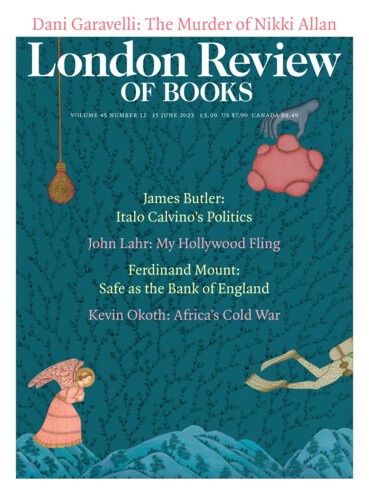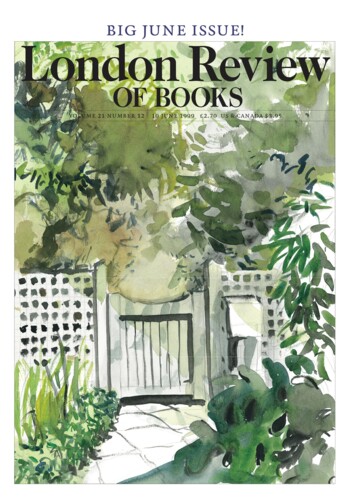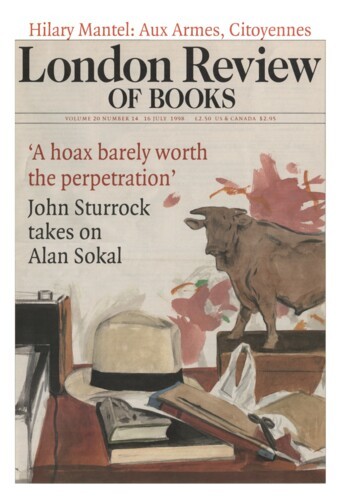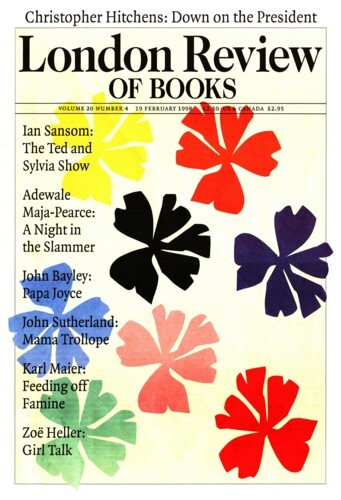Nicholas Jose
Nicholas Jose lives in Sydney. His novels include The Rose Crossing and The Custodians.
Pulping Herbert Read in a Washing-Machine: Chinese art
Nicholas Jose, 10 June 1999
Five years ago a man sat in meditation for a couple of hours in a stinking public latrine outside Beijing, his naked body smeared with honey to attract the flies. Now a photograph of the event hangs in two classy American exhibitions of contemporary Chinese art as the record of a work, 12 Square Metres. That’s the size of the toilet. By secluding himself in this way, the young performance artist Zhang Huan has become visible far beyond China. Such is the paradox of withdrawal and self-advancement for its belated avant-garde, and more generally in the late Nineties, for the country’s cultural élite. In Beijing’s dilapidated East Village, where urban bohemians live cheek by jowl with peasant farmers and other marginal groups, a small community of cognoscenti attended Zhang Huan’s original performance on 2 June 1994. Locals were concerned that it might be pornographic. In the San Francisco Museum of Modern Art, where I saw the work documented this year, there was a warning at the entrance that the exhibit might not be suitable for children, and parents routinely led their youngsters away. Inside, the black and white image was pulling a crowd: the artist’s gaze turned inward, his lean torso gilded like a Buddha’s, his genitals discreetly obscured. The flies looked like decorative studs.
Dun and Gum: Murray Bail
Nicholas Jose, 16 July 1998
‘To write but avoid becoming a “writer”. This feeling against is insistent and true,’ wrote Murray Bail in a diary in London in 1971. Usually it’s the other way round, the ambition being to become ‘a writer’ and no longer have to write. Bail’s spare output over 25 years might put him in the same category, were it not shaped by the contrary intention expressed in that early warning to himself. He has resisted the trappings of success, insisting with prickly pride on the obstacles in the way of proper literary achievement. Bail’s new novel, Eucalyptus, the first in 11 years, is the latest stage in his quest – and surprisingly suave.’‘
White Lie Number Ten: Australia’s aboriginal sovereignty
Nicholas Jose, 19 February 1998
Australia’s first Government House, built for Captain Arthur Phillip when he arrived with the first fleet of convicts and settlers in 1788, was demolished in 1846 to make way for the grander Neoclassical architecture that befitted a burgeoning colony. Today the site is the forecourt of the new Museum of Sydney, with the ghostly floor-plan of the original residence picked out in white on the granite flagstones. At its perimeter, adjoining a row of Victorian terraces once used for Customs and Immigration, stand 29 pillars of sandstone, steel, I-beam and hacked, charred wood. One is inscribed with the few known names of local Aborigines – the Eora people; others with Latin and Eora names for local botanical species. Several are inset with organic materials – ash, bone, shell, resin and human hair – that evoke the Eora’s world of fishing and feasting and its transformation (its holocaust) when white men came. As you walk among the pillars, you can hear taped Aboriginal voices, eerily disembodied, recite the placenames where the vanished Sydney clans once lived.’
Read anywhere with the London Review of Books app, available now from the App Store for Apple devices, Google Play for Android devices and Amazon for your Kindle Fire.
Sign up to our newsletter
For highlights from the latest issue, our archive and the blog, as well as news, events and exclusive promotions.




